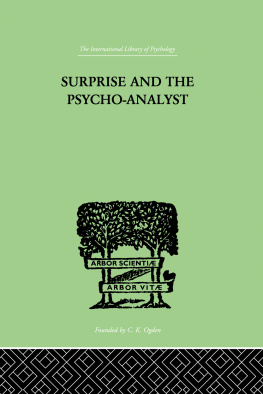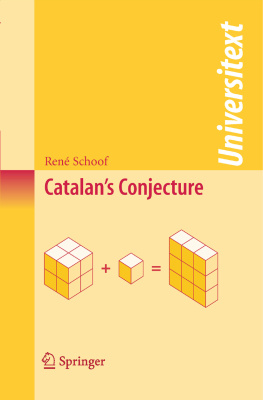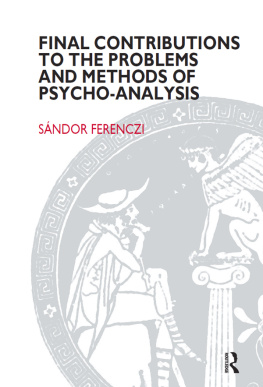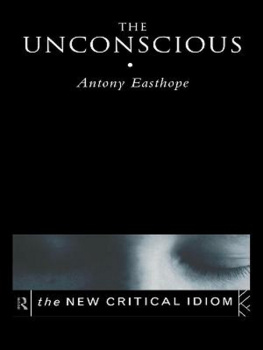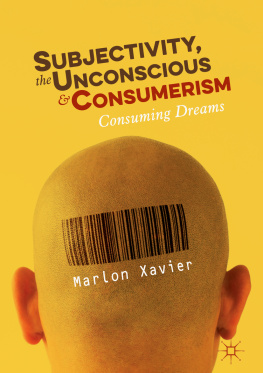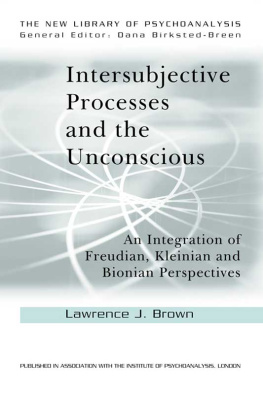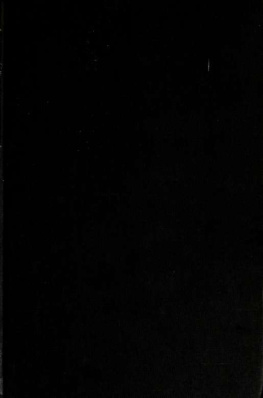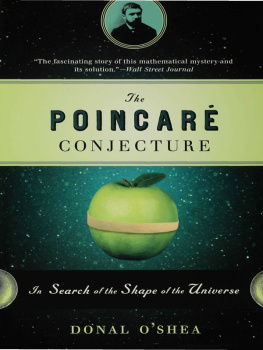
The International Library of Psychology
SURPRISE AND THE PSYCHO-ANALYST

The International Library of Psychology
COGNITIVE PSYCHOLOGY
In 21 Volumes
I | The Psycho-Analysis of Artistic Vision and Hearing | Ehrenzweig |
II | A Source Book of Gestalt Psychology | Ellis |
III | Common Sense and its Cultivation | Hankin |
IV | The Nature of Learning | Humphrey |
V | Eidetic Imagery and Typological Methods of Investigation | Jaensch |
VI | The World of Colour | Katz |
VII | Principles of Gestalt Psychology | Koffka |
VIII | Colour and Colour Theories | Ladd-Franklin |
IX | Sense-Perception and Matter | Lean |
X | Invention and the Unconscious | Montmasson |
XI | Psychology and Education | Ogden |
XII | Human Speech | Paget |
XIII | The Gestalt Theory and the Problem of Configuration | Petermann |
XIV | Surprise and the Psycho-Analyst | Reik |
XV | The Psychology of a Musical Prodigy | Rvsz |
XVI | Biological Memory | Rignano |
XVII | The Psychology of Reasoning | Rignano |
XVIII | The Effects of Music | Schoen |
XIX | Analysis of Perception | Smythies |
XX | Speech Disorders | Stinchfield |
XXI | The Psycho-Biology of Language | Zipf |
SURPRISE AND THE PSYCHO-ANALYST
On the Conjecture and Comprehension of Unconscious Processes
THEODOR REIK

First published in 1936 by
Routledge, Trench, Trubner & Co., Ltd.
Reprinted in 1999 by
Routledge
2 Park Square, Milton Park, Abingdon, Oxon, OX14 4RN
Transferred to Digital Printing 2007
1936 Theodor Reik
Translated from the German by Margaret M Green
All rights reserved. No part of this book may be reprinted or reproduced or utilized in any form or by any electronic, mechanical, or other means, now known or hereafter invented, including photocopying and recording, or in any information storage or retrieval system, without permission in writing from the publishers.
The publishers have made every effort to contact authors/copyright holders of the works reprinted in the International Library of Psychology. This has not been possible in every case, however, and we would welcome correspondence from those individuals/companies we have been unable to trace.
These reprints are taken from original copies of each book. In many cases the condition of these originals is not perfect. The publisher has gone to great lengths to ensure the quality of these reprints, but wishes to point out that certain characteristics of the original copies will, of necessity, be apparent in reprints thereof.
British Library Cataloguing in Publication Data
A CIP catalogue record for this book
is available from the British Library
Surprise and the Psycho-Analyst
ISBN 0415-20969-2
Cognitive Psychology: 21 Volumes
ISBN 0415-21126-3
The International Library of Psychology: 204 Volumes
ISBN 0415-19132-7
DEDICATED IN TOKEN OF FRIENDSHIP, TO
DR. I. E. G. VAN EMDEN
CONTENTS
SURPRISE AND THE PSYCHO-ANALYST
INTRODUCTORY
PSYCHOLOGY IS NOT SELF-EVIDENT
T HIS book is an attemptso far as I know, the firstto describe what is required of an investigator into the unconscious mental processes of another person, and what he achieves. By describing the psychological process of cognition from within, I intend at the same time to trace the way from conjecturing to comprehending the unconscious processes.
I shall not treat the processes of conjecture and comprehension of unconscious phenomena on the same footing. I shall establish the process of conjecture as far as my knowledge goes. As regards the process of comprehension, I shall only discuss its initial phases, its primary intent and psychical mechanism. This discrimination is due to the different part which the unconscious plays in the two processes; it is, of course, greater in the reconnoitring phase of conjecture than in the stage of cognition, in which the performances of the unconscious mind are apprehended with the resources and methods of conscious thought. I am concerned with the investigation of the unconscious and preconscious phases, leading from the perception of a psychical phenomenon to its comprehension.
Undoubtedly there are at the present time various schools of psychology occupied in the investigation of unconscious psychical phenomena. Yet there can no longer be any question but that psycho-analysis denotes that school which has penetrated furthest into the unexplored regions of the science. If we wish to know what goes on in the psychologist who grasps the unconscious processes in another, we must first depict the nature and direction, the preliminary conditions and aims, of the processes in question. In the present case, since I may assume a knowledge of the results attained by psycho-analytical research, this part of the inquiry is superfluous.
Nor am I concerned with a systematic restatement of the methods of analysis, but with its psychological prerequisites. The reader will, therefore, hear nothing of the theoretical assumptions and the nature of the method of penetrating into the unconscious depths, nothing of the principle of psychical determinism, of associations, the manipulation of dream interpretation, nothing of the technique of psycho-analysis in the sense in which we ordinarily understand it.
The methods of psycho-analysis have been frequently and fully described. We have a series of works on the subject, from Freuds early papers to the recent book by Imre Hermann.
From the present work I have deliberately excluded everything that has already been treated in the scientific literature of psycho-analysis; only such questions will be dealt with as, to the best of my knowledge, have not yet been discussed by psycho-analytical writers in a manner adequate to their importance. That does not imply that I intend to confine myself to original matter. Not everything contained in this book is new. What is new, is that it is stated. In this senseand only in this sensethe present work seeks to point to new roads in the technique of psycho-analysis.
In touching upon the subject of psycho-analytical technique, it will be well, I think, to utter a kind of warning
Next page
